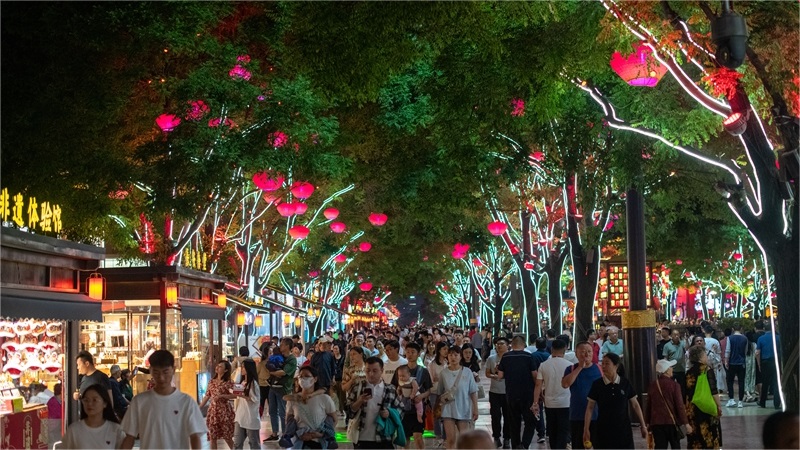Commentary: Yellen's "wall of opposition" is built on quicksand
BEIJING, May 26 (Xinhua) -- As the Group of Seven (G7) finance ministers and central bank governors met in Italy from Thursday to Saturday, U.S. Treasury Secretary Janet Yellen called for so-called market-driven countries to form a "wall of opposition" to China's industrial policies.
This call to arms has stirred a flurry of comments on social media platforms like Reddit. One highly up-voted comment highlighted the irony: "Just hilarious. The developed world got addicted to China's industrial capacity 30 years ago and now they are complaining because China is doing it too well."
Another Reddit user critiqued the hypocrisy: "You can't have your cake and eat it too. That's hypocritical liberalism for us."
In his famous 2004 book "Why Globalization Works," Martin Wolf, a renowned economist and columnist for the Financial Times, observed that the failure of our world is not that there is too much globalization, but that there is too little.
Wolf's observation is particularly worth revisiting as globalization is now encountering a new barrier artificially built by certain Western politicians who are attempting to junk fundamental principles of economics for political purposes.
One case in point is the comparative advantage theory, which has stood for over two centuries. This principle posits that if a country can produce a product at a lower cost, other nations should not erect tariff barriers but instead import that product, exporting their own goods where they hold a comparative advantage.
Ironically, the United States, as the world's leading exporter of aircraft, refined petroleum products, computer and electronic products, pharmaceuticals, medical equipment and supplies, civilian aircraft engines, and agricultural machinery, just to name a few, does not seem to apply the same "overcapacity" sophistry to itself.
Based on U.S. logic, U.S. subsidies are "investment in critical industries," whereas other countries' subsidies are seen as "worrying unfair competition;" and U.S. exports with comparative advantage constitute "free trade," whereas other countries' exports with comparative advantage are signs of "overcapacity."
For some U.S. politicians, overcapacity can only be a problem for others, especially when it comes to sectors where domestic industries are underdeveloped or at least fail to enjoy advantages. This explains the Biden administration's decision to impose hefty new tariffs on Chinese electric vehicles (EVs), lithium batteries, solar panels and other products.
This logic mirrors a common political malady, likely fueled by a mix of excess developmental anxieties, electoral pressures and a desire for immediate solutions. It overlooks the fact that global economic downturns and diminished market demand are external factors that exacerbate challenges, rather than any intrinsic flaws in China's economic model or industrial policies.
The accusations, particularly from figures like Yellen, are untenable. Her Made-in-China aversion also appears detached from the actual demands of the American people. A recent report on the U.S. website InsideEvs, titled "Gen Z Americans Are Much More Open To Chinese EVs Than You Think: Study," has shed light on this.
Automotive research firm AutoPacific has shared some enlightening information that Americans are pretty open to Chinese EVs, especially if they're younger buyers.
For the survey, AutoPacific queried 800 people aged from 18 to 80. The group learned that about 36 percent of all users surveyed said they would "definitely" or "maybe" consider a Chinese-branded EV. Still, that number skyrockets to a whopping 76 percent when we look only at the data for buyers below the age of 40. Millennials and Gen Z are very much open to a Chinese-branded EV. The truth is that if you have a compelling product and it's cheaper, it's tough in an economic sense to keep those vehicles out.
Rhetoric ranging from the "China threat" to "decoupling" and "de-risking" scapegoats China for various issues. Such rhetoric not only sidesteps the complexities of global challenges but also fails to offer tangible solutions or enhance people's well-being.
Yellen did express concern over substantial increases in living costs. In an interview published on Friday, Yellen said that although wages had gone up significantly, there were substantial price increases that were important to people, as such increases in a relatively short period of time were very noticeable.
If economics still holds sway, forming a coalition to erect an imagined "wall of opposition" against Chinese products will clearly not address the issue of high living costs, as the chief obstacle to making the world better is not its limited economic integration, but its political fragmentation.
As the New York Times observed in an article published earlier this month, Biden's decision to codify and escalate tariffs made clear that the United States has closed out a decades-long era that embraced trade with China and prized the gains of lower-cost products. It is not clear whether the U.S. public, still reeling from the country's most rapid burst of inflation in 40 years, will tolerate the pains that could accompany the transition.
The ancient Chinese adage, "Not turning back until one bumps into the southern wall," conveys the idea that one does not realize the need for change until faced with a dead end. Should a "wall of opposition" be cobbled up, one can only hope that it serves as the "southern wall" for those who built it, prompting a much-needed reassessment of their stance as early as possible.
Photos
Related Stories
- "Problem of China's overcapacity" does not exist, says Chinese ambassador
- Achieving green, low-carbon transition calls for more quality production capacity
- U.S. "overcapacity" narrative against China's new energy sector pure protectionism: spokesperson
- "Overcapacity" in China's new energy industry is pseudo-proposition
- The fallacious, dangerous logic of "Chinese overcapacity" rhetoric
- "China overcapacity" narrative to impact global recovery, green transition: commerce ministry
Copyright © 2024 People's Daily Online. All Rights Reserved.









